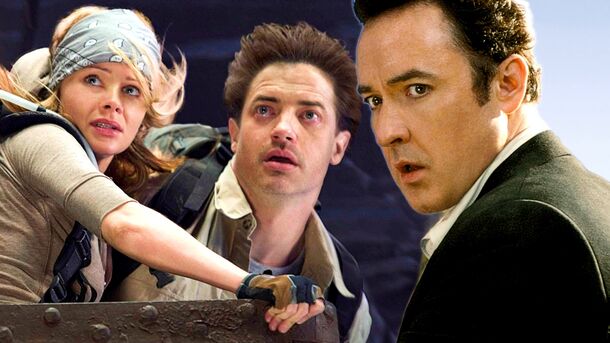10 Sci-Fi Movies That Ignored the 'Science' Part Completely

In these films the laws of physics were more like friendly suggestions.
1. "Armageddon" (1998)
%20LM1.jpg)
Starting with a bang – literally – is Michael Bay's 1998 action-packed epic, "Armageddon". It takes the cake for so many reasons. To begin with, NASA apparently decided it was easier to train oil drillers to be astronauts than the other way around. That's right – the future of humanity lies in the hands of Bruce Willis and his ragtag crew. While the film garnered three Oscar nominations for Best Sound, Best Visual Effects, and Best Original Song, the 'science' part was out there orbiting Jupiter. Neil deGrasse Tyson even went on record saying that "Armageddon" got its science wrong more than any other film he'd ever seen. But hey, we got that epic Aerosmith song out of it, so it's not all bad, right?
2. "The Day After Tomorrow" (2004)
.jpg)
Following the world-ending theme is Roland Emmerich's 2004 climate catastrophe film, "The Day After Tomorrow". Now, we're all for raising awareness about global warming, but let's face it, a sudden Ice Age descending upon the Earth in a matter of days? Even Elsa would raise an eyebrow at that. Despite the film's fast-and-loose handling of climate science, it was a box office success, raking in more than $500 million worldwide. Audiences seemed to enjoy the epic disaster visuals, even if the science was icier than a polar bear's picnic.
3. "The Core" (2003)
.jpeg)
Staying within the disaster movie genre, we move to "The Core". The film's premise of the Earth's core stopping its rotation, causing an electromagnetic catastrophe, makes for thrilling cinema but shoddy science. Its solution, to jump-start the core with nuclear bombs, had geophysicists laughing harder than a hyena at a stand-up comedy show. Despite its far-fetched science, the film still drew an audience, earning a respectable $74 million at the box office. And let's not forget the Academy Award nominee, Hilary Swank, piloting the 'Earth ship', a delightful cherry on this science-gone-wrong sundae.
4. "Lucy" (2014)
%20GL.jpeg)
"Lucy", released in 2014, saw Scarlett Johansson play a woman who develops superhuman abilities after a drug allows her to use more than the typical 10% of her brain. While it's a fascinating concept, scientists everywhere groaned. The whole 'we only use 10% of our brain' myth is about as scientifically accurate as a flat earth theory. Despite its scientific shortcomings, "Lucy" was a hit at the box office, grossing over $460 million worldwide, and Johansson's performance was highly praised.
5. "Transformers" Series (2007-2019)

Michael Bay's "Transformers" series kicks scientific logic out of the window faster than Optimus Prime can say "Autobots, roll out". The concept of sentient robotic aliens that transform into cars, trucks, and planes makes for spectacular action sequences and merchandise sales, but stumbles when it comes to hard science. Physics would like a word about those mass-shifting transformations. Yet, it's hard to argue with the box office numbers, with the series pulling in billions globally, proving that sometimes, audiences don't mind a little scientific liberty in their popcorn flicks.
6. "2012" (2009)
%20GL1.jpeg)
Roland Emmerich strikes again with "2012," a film that took the ancient Mayan prediction of the world's end and sprinted with it. The film hypothesized that neutrinos from a massive solar flare cause the Earth's core to heat rapidly, leading to a series of apocalyptic natural disasters. The scientific community, however, was quick to denounce the film's dramatic bending of physical laws. Neutrinos, despite their abundant presence, are mostly harmless because they rarely interact with matter. Yet, despite its debatable scientific premise, "2012" managed to make over $700 million worldwide, showing that the allure of disaster scenarios can outshine the need for accurate science.
7. "What The #$*! Do We (K)now!?" (2004)
.jpeg)
Next up is the film "What The #$*! Do We (K)now!?" which attempted to blend documentary-style interviews, computer-animated graphics, and a narrative story to explain quantum physics. Unfortunately, many scientists felt the film misrepresented and over-simplified complex quantum theories and phenomena. Several interviewed physicists later stated they were misquoted or taken out of context. Despite these criticisms, the film surprisingly managed to find an audience, grossing over $10 million in the United States, with a sequel, "Down the Rabbit Hole," following in 2006.
8. "Journey to the Center of the Earth" (2008)
%20GL.jpeg)
"Journey to the Center of the Earth" follows a scientist and his nephew who, well, journey to the center of the Earth. It's a fun-filled adventure with dinosaurs, giant mushrooms, and floating magnetic rocks. The only thing missing? Actual science. The Earth's core, with temperatures over 5000 degrees Celsius and immense pressure, isn't quite as hospitable as the film suggests. Regardless of its scientific missteps, the film was a financial success, grossing over $240 million worldwide, and spawned a sequel, "Journey 2: The Mysterious Island."
9. "The Happening" (2008)
.jpg)
M. Night Shyamalan's "The Happening" proposes an intriguing concept – plants releasing toxins that cause humans to commit suicide as a defense mechanism against environmental threats. The film was heavily criticized for its scientific inaccuracy. Botanists quickly debunked the plausibility of such a scenario. Despite its scientific shortcomings and mixed reviews, "The Happening" made over $160 million worldwide. Its thought-provoking premise, even if scientifically flawed, managed to engage viewers.
10. "I Am Legend" (2007)

Wrapping up our list is "I Am Legend". The film envisions a post-apocalyptic world overrun by victims of a virus originally created to cure cancer. While the idea of a genetically-engineered virus is not too far-fetched, the concept of it wiping out the majority of humanity while also creating superhuman vampire-like creatures stretches scientific credibility. Nonetheless, "I Am Legend" was a commercial success, with audiences drawn to Will Smith's strong performance. The film grossed over $580 million worldwide.
